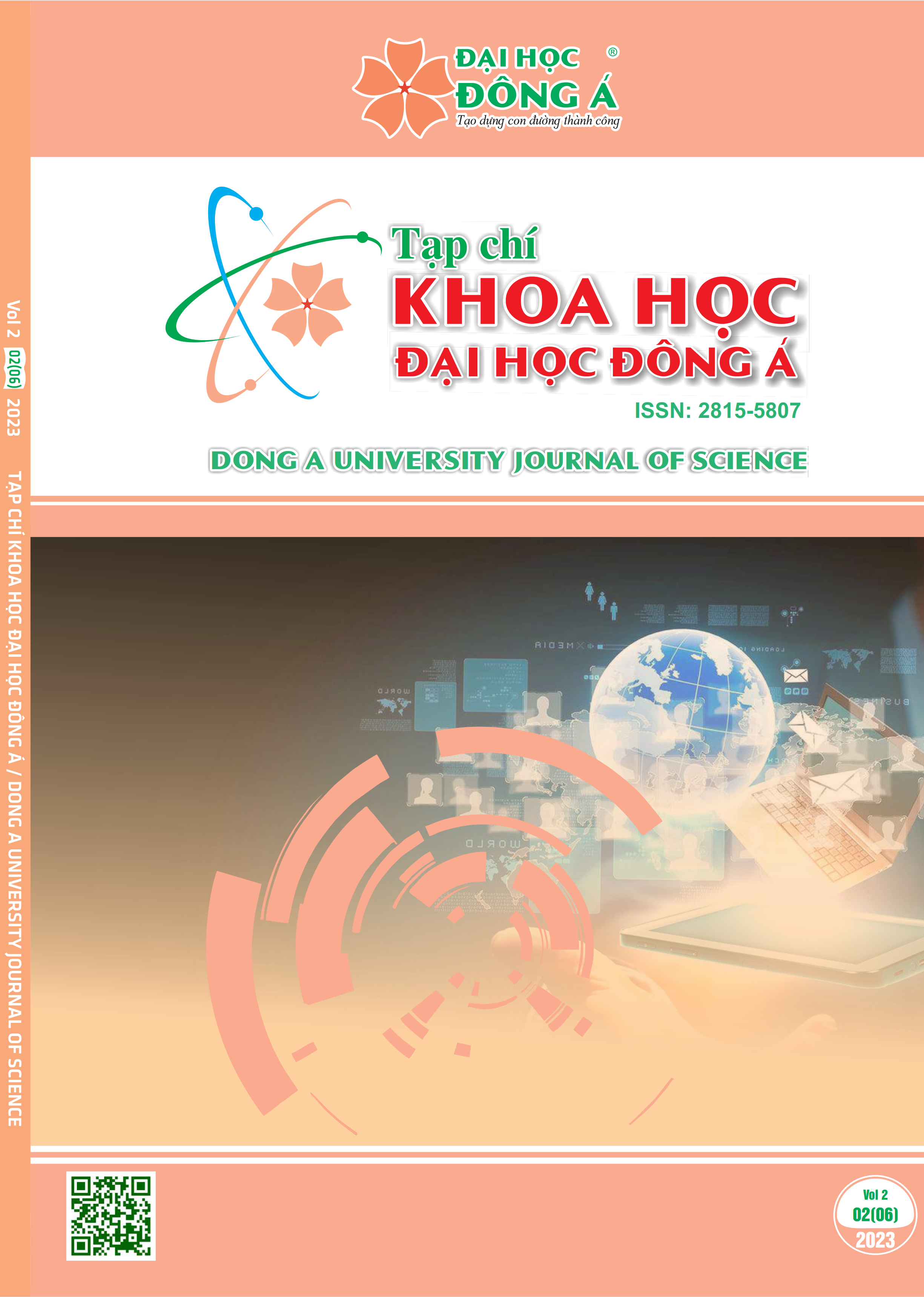Nghiên cứu sự hài lòng của khách du lịch hộ gia đình đối với chất lượng dịch vụ lưu trú tại Đà Nẵng
Nội dung chính của bài viết
Tóm tắt
Mục đích của bài báo nhằm đánh giá sự khác biệt của các biến nhân khẩu học của khách du lịch hộ gia đình đối với sự hài lòng về chất lượng dịch vụ, cả về khía cạnh kỹ thuật và khía cạnh chức năng của cơ sở lứu trú (CSLT) tại điểm đến Đà Nẵng. Một bảng câu hỏi được thiết kế theo cấu trúc hợp lý để khảo sát ý kiến của 530 khách du lịch bằng cách kết hợp giữa phỏng vấn trực tiếp và điền mẫu trực tuyến, trong đó có 480 mẫu đạt yêu cầu (tỷ lệ 90,56%). Về phương pháp xử lý số liệu, phần mềm SPSS 25.0 được sử dụng để thống kê mô tả đặc điểm nhân khẩu học mẫu nghiên cứu, phân tích hệ số Cronbach’s Alpha để xác định độ tin cậy của các thang đo và kiểm định One – Way ANOVA để tìm ra sự khác biệt giữa các giá trị của từng biến nhân khẩu học theo độ tuổi, trình độ và quốc tịch khách du lịch. Kết quả không tìm thấy sự khác biệt có ý nghĩa thống kê giữa các biến nhân khẩu về sự hài lòng đối với chất lượng dịch vụ các CSLT. Đóng góp về mặt khoa học của bài báo thể hiện ở việc mở rộng kiến thức về chất lượng dịch vụ cũng như xây dựng công cụ đo lường sự hài lòng của khách du lịch hộ gia đình về chất lượng dịch vụ cơ sở lưu trú trong điều kiện thực tiễn Việt Nam.
Chi tiết bài viết
Từ khóa
du lịch hộ gia đình, cơ sở lưu trú, chất lượng dịch vụ, COVID-19, sự hài lòng
Tài liệu tham khảo
Benitez, J. M., Martín, J. C., & Román, C. (2007). Using fuzzy number for measuring quality of service in the hotel industry. Tourism management, 28(2), 544-555.
Bigné, J. E., Andreu, L., Küster, I., & Blesa, A. (2005). Quality market orientation: tourist agencies’ perceived effects. Annals of Tourism Research, 32(4), 1022-1038.
Campo, S., & Jesús Yagüe, M. (2009). Exploring non‐linear effects of determinants on tourists' satisfaction. International Journal of Culture, Tourism and Hospitality Research, 3(2), 127-138.
Chang, J. C. (2009). Taiwanese tourists' perceptions of service quality on outbound guided package tours: A qualitative examination of the SERVQUAL dimensions. Journal of vacation marketing, 15(2), 165-178.
Chính phủ. (2017, 12 31). Quy định một số điều của Luật du lịch. Nghị định (168/2017/NĐ-CP).
Cristobal, E., Flavian, C., & Guinaliu, M. (2007). Perceived e‐service quality (PeSQ): Measurement validation and effects on consumer satisfaction and web site loyalty. Managing service quality: An international journal.
Gopalan, R., & Narayan, B. (2010). Improving customer experience in tourism: A framework for stakeholder collaboration. Socio-Economic Planning Sciences, 44(2), 100-112.
Grönroos, C. (1984). A service quality model and its marketing implications. European Journal of marketing, 18(4), 36-44.
Gunasekaran, N., & Anandkumar, V. (2012). Factors of influence in choosing alternative accommodation: A study with reference to Pondicherry, a coastal heritage town. Procedia-Social and Behavioral Sciences, 62, 1127-1132.
Guttentag, D., Smith, S., Potwarka, L., & Havitz, M. (2018). Why tourists choose Airbnb: A motivation-based segmentation study. Journal of Travel Research, 57(3), 342-359.
Choi, H., Ann, S., Lee, K. W., & Park, D. B. (2018). Measuring service quality of rural accommodations. Sustainability, 10(2), 443.
Kasiri, L. A., Cheng, K. T. G., Sambasivan, M., & Sidin, S. M. (2017). Integration of standardization and customization: Impact on service quality, customer satisfaction, and loyalty. Journal of Retailing and Consumer Services, 35, 91-97.
Nusair, K. K., & Kandampully, J. (2008). The antecedents of customer satisfaction with online travel services: a conceptual model. European Business Review.
Velázquez, B. M., Saura, I. G., & Molina, M. E. R. (2011). Conceptualizing and measuring loyalty: Towards a conceptual model of tourist loyalty antecedents. Journal of vacation marketing, 17(1), 65-81.
Moreno-Gil, S., & Martin-Santana, J. D. (2015). Understanding the image of self-contained and serviced apartments: the case of sun and beach destinations. Journal of Hospitality & Tourism Research, 39(3), 373-400.
Nunnally, J. C. (1978). Psychometric Theory 2nd ed. Mcgraw hill book company.
Nusair, K. K., & Kandampully, J. (2008). The antecedents of customer satisfaction with online travel services: a conceptual model. European Business Review.
Priporas, C. V., Stylos, N., Rahimi, R., & Vedanthachari, L. N. (2017). Unraveling the diverse nature of service quality in a sharing economy: A social exchange theory perspective of Airbnb accommodation. International journal of contemporary hospitality management, 29(9), 2279-2301.
Svari, S., Svensson, G., Slåtten, T., & Edvardsson, B. (2010). A DIP‐construct of perceived justice in negative service encounters and complaint handling in the Norwegian tourism industry. Managing Service Quality: An International Journal, 20(1), 26-45.
Tổng cục Du lịch. (2017). Tiêu chuẩn quốc gia TCVN 7800:2017. Nhà ở có phòng cho khách du lịch thuê (Homestay).
Tussyadiah, I. P. (2016). Factors of satisfaction and intention to use peer-to-peer accommodation. International Journal of Hospitality Management, 55, 70-80.
Zehrer, A. (2009). Service experience and service design: concepts and application in tourism SMEs. Managing Service Quality: An International Journal, 19(3), 332-349.


